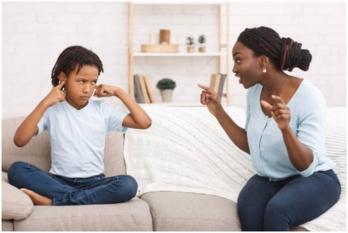 Children have been home for about 4 months due to the current lock down of school. For many parents, discipline is one of the toughest parts of the job to do at this time and beyond. But it’s also one of the most important, because of its long-term impacts on our children’s view of the world and the way they treat themselves and others. It is a fact that parents juggle many things in a day, the increased stress levels from work and home life can cloud our judgement at times. The tendency to lose our patience and resort to taking these feelings out on kids through punishment is very high. This is often detrimental to the children, hence the advocacy for Positive Discipline. It is also important to understand that the children at this time are struggling with different emotions arising from the confinement they have been subjected to over the past few months. Positive discipline is the practice of reinforcing and teaching good behaviors while eliminating bad and unwanted behaviors without harming the child physically or verbally.
Children have been home for about 4 months due to the current lock down of school. For many parents, discipline is one of the toughest parts of the job to do at this time and beyond. But it’s also one of the most important, because of its long-term impacts on our children’s view of the world and the way they treat themselves and others. It is a fact that parents juggle many things in a day, the increased stress levels from work and home life can cloud our judgement at times. The tendency to lose our patience and resort to taking these feelings out on kids through punishment is very high. This is often detrimental to the children, hence the advocacy for Positive Discipline. It is also important to understand that the children at this time are struggling with different emotions arising from the confinement they have been subjected to over the past few months. Positive discipline is the practice of reinforcing and teaching good behaviors while eliminating bad and unwanted behaviors without harming the child physically or verbally.
Positive discipline guides children away from danger, demonstrates self-control, and teaches them how to make appropriate choices. It also develops positive
The difference between positive discipline and punishment
Positive discipline guides children away from danger, demonstrates self-control, and teaches them how to make appropriate choices. It also develops positive relationships between children and parents, helps build confidence and self-esteem.
Punishment, on the other hand, teaches children that physical force is the way to solve problems. The parent has control and the child must always obey regardless of their needs or wishes. The relationship between children and parents break down and instills fear rather than respect.
Here are some known strategies for Positive Discipline
1. Redirection: Little ones have a short attention span, so it’s not too difficult to redirect them to another activity when they’re acting out. If your toddler is playing with an object that could be dangerous, introduce another toy that will grab his attention. If that doesn’t work, take him to another room or go outside to divert his attention.
Tell an older child what he can do, rather than what he can’t. So rather than tell him he can’t watch TV anymore, tell him he can go outside to play or he can work on a puzzle. Staying focused on the positive can reduce a lot of arguments and defiant behavior.
2. Positive Reinforcement: Praise your child’s good behavior. If your child shares a toy with a friend or sibling, tell her how generous she is. If your child extends kindness to someone else, point out what a great job she did. This gives her positive attention for what she’s done right, rather than reinforced the things she did that are against the rules. When your child does break the rules, explain how she can make a better choice in the future.
3. Use Single-Word Reminders: Rather than making demands on your child (Eat your food! Sit on the chair! Come back here!) say one word in a casual tone: Eat. Sit. Come. With this gentle reminder, the child won’t get defensive but rather remember what the proper behavior is.
Sometimes, you need to pick and choose your battles. You will burn out if you are constantly redirecting or telling children what to do. If it’s a minor problem, it may be advisable to turn a blind eye. Also if the child is prone to acting out with view to getting negative attention, it reduces the number of times they will seek that attention.
Here are reasons you should opt for positive discipline
· It helps children feel a sense of connection. (Belonging and significance)
· It is mutually respectful and encouraging. (Kind and firm at the same time.)
· It Is effective long-term. ...
· It teaches important social and life skills. ...
· It invites children to discover how capable they are.
Thank you for reading through, we hope you have been keeping safe.

